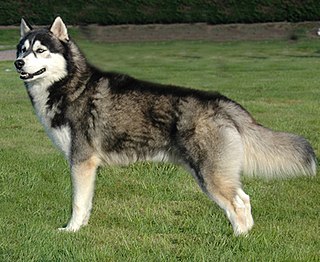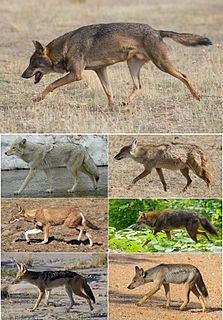Related Research Articles

The Siberian Husky is a medium-sized working dog breed. The breed belongs to the Spitz genetic family. It is recognizable by its thickly furred double coat, erect triangular ears, and distinctive markings, and is smaller than a very similar-looking dog, the Alaskan Malamute.

The wolf, also known as the gray wolf or grey wolf, is a large canine native to Eurasia and North America. It is the largest extant member of Canidae, with males averaging 40 kg (88 lb) and females 37 kg (82 lb). On average, wolves measure 105–160 cm (41–63 in) in length and 80–85 cm (31–33 in) at shoulder height. The wolf is also distinguished from other Canis species by its less pointed features, particularly the ears and muzzle. The wolf is nonetheless closely related enough to smaller Canis species, such as the coyote and the golden jackal, to produce fertile hybrids with them. The winter fur of a wolf is long and bushy and predominantly mottled gray, although nearly pure white, red and brown to black colours also occur. Up to 38 subspecies of wolf have been recognized including the domestic dog.

Canine distemper is a viral disease that affects a wide variety of animal families, including domestic and wild species of dogs, coyotes, foxes, pandas, wolves, ferrets, skunks, raccoons, and large cats, as well as pinnipeds, some primates, and a variety of other species. Animals in the family Felidae, including many species of large cat as well as domestic cats, were long believed to be resistant to canine distemper, until some researchers reported the prevalence of CDV infection in large felids. Both large Felidae and domestic cats are now known to be capable of infection, usually through close housing with dogs or possibly blood transfusion from infected cats, but such infections appear to be self-limiting and largely without symptoms.
Canine may refer to:

Canis is a genus of the Canidae containing multiple extant species, such as wolves, dogs, coyotes and jackals. Species of this genus are distinguished by their moderate to large size, their massive, well-developed skulls and dentition, long legs, and comparatively short ears and tails.

A wolfdog is a canine produced by the mating of a domestic dog with a gray wolf, eastern timber wolf, red wolf, or Ethiopian wolf to produce a hybrid.

The Tibetan Mastiff is a large Tibetan dog breed belonging to the mastiff family. Originating with the nomadic cultures of Tibet, China, Mongolia, India and Nepal, it is used by local tribes of Tibetans and Indians to protect sheep from wolves, leopards, bears, large mustelids, and tigers.
Wolf generally refers to the wolf, Canis lupus.
Friday is a day of the week.
Canine reproduction is the process of sexual reproduction in domestic dogs, wolves, coyotes and other canine species.

Dog behavior is the internally coordinated responses of individuals or groups of domestic dogs to internal and external stimuli. It has been shaped by millennia of contact with humans and their lifestyles. As a result of this physical and social evolution, dogs, more than any other species, have acquired the ability to understand and communicate with humans, and they are uniquely attuned in these fellow mammals. Behavioral scientists have uncovered a wide range of social-cognitive abilities in the domestic dog.
This is a list of lists of notable fictional animals.